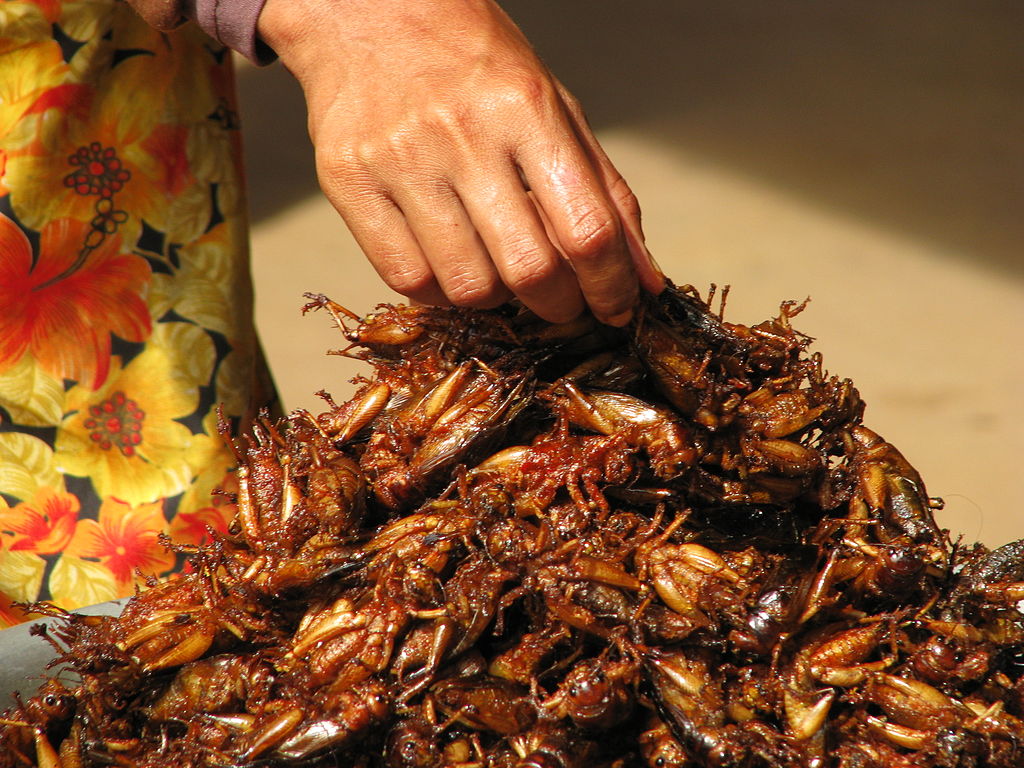Introduction
This is a brief interview I did by email with Brenna Piccoli-Auckram on why I oppose using insects as a future food source in developed countries. The questions are in green.
Interview
Why do you believe insects cannot/should not be consumed as a main protein source in developed countries?
 The main argument is that insects appear to be capable of at least simple forms of suffering, and orders of magnitude more insects need to be farmed to produce a kilogram of protein than cows or chickens. Thus, multiplying per-individual suffering by the number of individuals plausibly yields a higher amount of total suffering for insect farming than for farming of larger animals.
The main argument is that insects appear to be capable of at least simple forms of suffering, and orders of magnitude more insects need to be farmed to produce a kilogram of protein than cows or chickens. Thus, multiplying per-individual suffering by the number of individuals plausibly yields a higher amount of total suffering for insect farming than for farming of larger animals.
Some people claim that insects thrive in the cramped, dark living conditions on farms, but the insects will still inevitably endure some suffering, especially if disease breaks out, cannibalism occurs, or handling is poor. Some studies on insect farming have found relatively high mortality rates. And of course, all the insects will be killed one way or another within a few weeks or months of birth. Some insects are killed by heating to death, which is probably extremely painful.
Do you think more needs to be done to help reduce the food insecurity in developing countries? If yes, why?
Certainly! Millions of children die of hunger or hunger-related causes each year, which causes immense suffering. While I'm not an expert on international development, my impression is that the best long-term solution for world hunger is to reduce poverty. As many anti-hunger advocates say, the world has more than enough food, and hunger is a matter of not distributing the food properly.
In the future, do you believe Western Society will be pushed into the consumption of plant-based proteins instead of common meat proteins?
I expect there will be increasing pressure to consume plant-based proteins, especially as climate change becomes more severe and other natural resources become more scarce. I don't expect any complete shift away from meat production any time soon, because old habits and industries are well established. It's possible that a few decades from now, cultured meat will become cost-competitive with regular meat, in which case we might see a large fraction of consumers switch to that.
It is often believed that insects ‘don’t feel emotions’ like that of livestock. Do you think this is true?
Insects do have much simpler nervous systems than those of vertebrates. This suggests less capacity for rich, complex thoughts. However, many of the basic abilities of vertebrates are found in at least some insects, including sensing, learning, memory, selective attention, cognitive generalization, and navigation. Neurobiologist Nicholas Strausfeld said: "Many people would pooh-pooh the notion of insects having brains that are in any way comparable to those of primates. But one has to think of the principles underlying how you put a brain together, and those principles are likely to be universal."
A number of studies have found at least simple emotion-like states in bees, fruit flies, woodlice, and so on. Neuroscientist Antonio Damasio has said: “I have every reason to believe that invertebrates not only have emotions but also the possibility of feeling those emotions.”
Explain why you think companies do not widely promote the consumption of plant based proteins, but rather the consumption of insects?
I think more food companies do focus on plant proteins than insect proteins. Even ordinary products like tofu and soy milk are plant-based alternatives to meat, and these are much more commonly consumed in the West than insects are. I think some companies are pursuing insect products because there is at least a bit of a market for them, partly because of the novelty factor and partly because some people prefer eating animal proteins over plant proteins.
A lot of insect farming is focused on providing food for livestock rather than human consumption, such as replacing fishmeal for farmed fish. Unfortunately from my perspective, these markets for farmed insects seem more viable because there's less of an "ick" factor and there are probably fewer health/safety concerns. Plant-based fish feed is also possible, and I wish more companies were pursuing that.
Where and when do you think the world’s next protein supply is going to form?
I don't expect any single new source. Prices change over time as supply and demand fluctuate, which tends to gradually change consumption trends of various products. I expect more plant-based and (sadly) insect-based livestock feeds as forage-fish supplies decline due to overfishing. Both for health and environmental reasons, there has been and probably will continue to be a shift from mammal meat to chicken meat, which I find unfortunate because it takes many more chickens than cows to produce the same amount of meat. Meat substitutes will also slowly gain in popularity, as companies like Hampton Creek, Memphis Meats, and Impossible Foods are demonstrating.
How did you become passionate about ethics/animal welfare?
During high school I was very interested in politics and activism to help humans, but I didn't think about non-human animals because I didn't believe animals could feel pain and had never heard any philosophical arguments for caring about animals. Toward the end of high school, I discovered the writings of Peter Singer and was immediately convinced that animal suffering was not only important but was potentially the most important moral issue in the world given its scale and severity. Since most people care much more about human welfare than animal welfare, work to help animals is often neglected compared with work to help humans.